Theresa Smith's Blog, page 89
November 27, 2019
#TBT What I was reading this time six years ago…
[image error]
Masquerade is the second book in the seven book Blue Bloods fantasy series by Melissa de la Cruz. This series is quite old and predates all of the Twilight and subsequent vampire fantasy hype. I think of it as one of the original series – and best, although seriously under-rated – of this sub genre. An interesting thing to note: The Mortal Instruments series by Cassandra Clare has some disturbingly similar scenes in its last book that mirror those in the last book of the Blue Bloods series, which was of course written long before. I enjoyed The Mortal Instruments, but the last book really let me down with this, let’s just call it, ‘coincidental’ plot. Sadly, for Melissa de la Cruz, The Mortal Instruments has probably sold a lot more and likely remains more well known. It’s a dog eat dog world at times, particularly in the vampire/angel fantasy series universe.
[image error]
Have you read this series? Did you love it or hate it – or somewhere in between? I’ll happily own up to loving it. I don’t read this genre nowadays, but six years ago I relished it.

November 26, 2019
Book Review: The Weekend by Charlotte Wood
About the Book:
[image error]
The brilliant new novel from Charlotte Wood, acclaimed author of The Natural Way of Things.
Four older women have a lifelong friendship of the best kind: loving, practical, frank and steadfast. But when Sylvie dies, the ground shifts dangerously for the remaining three. Can they survive together without her?
They are Jude, a once-famous restaurateur, Wendy, an acclaimed public intellectual, and Adele, a renowned actress now mostly out of work. Struggling to recall exactly why they’ve remained close all these years, the grieving women gather for Christmas at Sylvie’s old beach house – not for festivities, but to clean the place out before it is sold.
Without Sylvie to maintain the group’s delicate equilibrium, frustrations build and painful memories press in. Fraying tempers, an elderly dog, unwelcome guests and too much wine collide in a storm that brings long-buried hurts to the surface – and threatens to sweep away their friendship for good.
The Weekend explores growing old and growing up, and what happens when we’re forced to uncover the lies we tell ourselves. Sharply observed and excruciatingly funny, this is a jewel of a book: a celebration of tenderness and friendship that is nothing short of a masterpiece.
My Thoughts:
If you are going into this one because you liked The Natural Way of Things, you need to know that The Weekend is entirely different, with one exception: the brilliant writing.
‘This was something nobody talked about: how death could make you petty. And how you had to find a new arrangement among your friends, shuffling around the gap of the lost one, all of you suddenly mystified by how to be with one another.’
This is a novel about female friendship that has been coloured by grief, and although the main characters are each in their seventies, I do feel that this is a story that women of other ages could connect with. I certainly did, and I’m in my forties.
‘At the same instant they each lifted a hand to shade their eyes, in a motion Adele had seen hundreds, thousands of times through all the decades of their friendship. She remembered them from long ago, two girls alive with purpose and beauty. Her love for them was inexplicable.’
Each of these women were likeable and not, in equal measure, like real people, I suppose. Balanced against their grief for Sylvie and their irritations with each other was a very real concern for their own circumstances within the framework of ageing. Overall, I felt as though each character got enough airtime and no one’s issues overshadowed the other. It made for an entertaining read, the shifting perspectives. The weaving into the narrative of their respective as well as mutual histories was also well done.
‘Until now she had never considered that the worn rubber band of their friendship might one day simply disintegrate. It seemed impossible. But a deadness had crept into their feelings for one another and, it seemed now, was spreading.’
I read The Weekend in one day, on the weekend! It was one of those novels that made for easy reading, despite the thought provoking content and heavy themes. Honestly, it was an incredibly uplifting read and I highly recommend it.
‘And each of the three let go, plunged down and felt herself carried, lifted up in the great sweep of the water’s force, and then – astonishingly gently – set down on her feet again. They breathed, and wiped their eyes, reached for each other again, waited for the next wave.’





Thanks extended to Allen & Unwin for providing me with a copy of The Weekend for review.
About the Author:
Charlotte Wood has been described as ‘one of our most original and provocative writers’. She is the author of six novels and two books of non-fiction. Her bestselling novel, The Natural Way of Things, won the 2016 Stella Prize, the Indie Book of the Year and Indie Book Award for Fiction, was joint winner of the Prime Minister’s Literary Award for Fiction, and was published throughout Europe, the United Kingdom and North America. She has been twice shortlisted for the Miles Franklin Literary Award, as well as many others for this and previous works. Her non-fiction books include The Writer’s Room, a collection of interviews with authors about the creative process, and Love & Hunger, a book about cooking. She lives in Sydney with her husband.
The Weekend
Published by Allen & Unwin
Released October 2019
Read for #TheWeekendBuddyRead with the Page by Page Book Club with Theresa Smith Writes
November 25, 2019
Book Review: Your Own Kind of Girl by Clare Bowditch
About the Book:
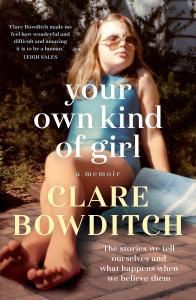
ARIA Award-winning singer and actress Clare Bowditch confronts her inner critic in this no-holds-barred memoir.
This is the story I promised myself, aged twenty-one, that I would one day be brave enough – and well enough – to write.
Clare Bowditch has always had a knack for telling stories. Through her music and performing, this beloved Australian artist has touched hundreds of thousands of lives. But what of the stories she used to tell herself? That ‘real life’ only begins once you’re thin or beautiful, that good things only happen to other people.
YOUR OWN KIND OF GIRL reveals a childhood punctuated by grief, anxiety and compulsion, and tells how these forces shaped Clare’s life for better and for worse. This is a heartbreaking, wise and at times playful memoir. Clare’s own story told raw and as it happened. A reminder that even on the darkest of nights, victory is closer than it seems.
With startling candour, Clare lays bare her truth in the hope that doing so will inspire anyone who’s ever done battle with their inner critic. This is the work of a woman who has found her true power – and wants to pass it on. Happiness, we discover, is only possible when we take charge of the stories we tell ourselves.
My Thoughts:
I have never read a more meaningful memoir, nor a more spot on account of trauma, grief, and mental illness until now, with this book: Your Own Kind of Girl. From my reckoning, Clare and I are of a similar age, so there was a great deal of nostalgia and relatable moments throughout this book for me. As a teen in the 90s, I was heavily influenced by the skeletal super model movement, and while eating disorders are more complicated than simply emulating media impressions, this was, for me, where it all began, where the ‘permission’ to be as thin as possible came from. So yes, there was a lot within this book that reached out and grabbed a hold of me. So much.
‘This crying felt like it was for a million reasons and, at the same time, I couldn’t pinpoint even one. This crying felt like there was no use talking about it because it wouldn’t make any sense, ever.’
Clare Bowditch successfully demonstrates with this book that she is a brilliant writer. Many of us have already known this via her songs, but she displays her style with so much more depth within this book. It is honest, raw, brought me to tears several times, but it also made me laugh, and smile with happiness. To be able to unpack your life with such finesse, and with such a lack of self-pity and external blame, is a real skill. Historically, I am not a fan of memoirs. However, Your Own Kind of Girl is a memoir unlike any I have read before, so much so, that I kind of forgot I was even reading a memoir – that good!
‘Sometimes, what starts at a breakdown really can become the moment you look back on as a breakthrough, as the moment in which you started to live your own kind of life.’
I loved the arrangement of this book too. It wasn’t necessarily linear, but more themed around the events and stages of Clare’s journey towards becoming her own kind of girl. The chapters were quaintly titled with Clare’s own song titles – I love this sort of attention to detail, it gets me every time.
‘This time, I was able to make something of my heartbreak, and this is when I got it – that songs are like containers. They are one of the only things in the world strong enough to hold emotions this raw, and this contradictory. A song is like a Tardis of meaning.’
Overall, after reading this book, I reached the end and thought that not only is Clare Bowditch a strong and beautiful woman, she is a role model for anyone trying to make their way into a creative career. This is a book for anyone and everyone. There is so much in it about being a human in a chaotic world and I seriously cannot recommend it highly enough.
‘I suppose I’m telling this story because I want to make the point – a career is a thing that’s made up of one tiny step, one small act of courage after the other.’





Thanks extended to Allen & Unwin for providing me with a copy of Your Own Kind Of Girl for review.
About the Author:
Clare Bowditch is a storyteller who lives in Melbourne with her husband Marty, their three teenage children, a white groodle, and one lone surviving free-ranging guinea pig. In terms of ‘the fancy stuff’, Bowditch is a bestselling ARIA Award-winning musician (Best Female Artist), Rolling Stone Woman of the Year (Contribution to Culture), Logie-nominated actor (for her role as ‘Rosanna’ on hit TV show Offspring), and a former ABC broadcaster who still misses her talk-back callers very much, and hopes they’re doing okay out there. In her spare time, Bowditch does a lot of public-speaking and event-running. She uses humour and the collective terror of ‘public-singing’ as tools to teach skills around courage and self-leadership. She is also the founder Big Hearted Business, a love project designed to support creative people in their businesses, and businesses with their creative thinking. As a musician Clare has performed and toured with the likes of Leonard Cohen, Paul Kelly, Cat Power, John Butler, Snow Patrol and Gotye. The person she enjoys touring with the most is her drummer and husband, Marty Brown.
[image error]
Your Own Kind of Girl
Published by Allen & Unwin
Released October 2019
November 22, 2019
#BookBingo – Round 24
This one is a double round. First up, I have:
Written by an author over the age of 65
Bingo! Another row completed…
For this round, I have the perfect choice in:
Rosa: Memories With Licence by Ros Collins
[image error]
Ros writes in such a warm and conversational style, giving the reader the same feeling you would get if you were sitting opposite her drinking tea and listening to her recount memories and family stories. Her personality really shone through for me, turning this into a most enjoyable reading experience. Ros describes her book as a means of offering:
‘A small window into some unfamiliar scenes of Anglo-Australian-Jewish life.’
And this is exactly what she does. Rather than offer a chronological history, she has fashioned the book in a more eclectic style, like a series of vignettes, each chapter themed to a certain agenda. In this it wanders, but I liked that about it, dipping in and out of Rosa’s history, pondering alongside her on the greater meaning of life’s moments.
Next up is:
A non-fiction book about an event
I’m cheating a bit here and using a book I read late in December of last year after I’d finished the 2018 bingo but before I’d begun this current one – a could be, maybe, will be selection! I just don’t read much non-fiction because they tend to take more in terms of time and concentration, two things I’m seriously lacking of late, and any that I have on my immediate TBR are not ‘event’ related like this one was. Besides, this was a cracking good read and I’m happy to be able to give it another shout out.
Mutiny on the Bounty by Peter Fitzsimons
[image error]
Mutiny on the Bounty is a vastly comprehensive book, with nothing left unexplored. I loved that about it, that people didn’t just drop off the radar. We got to know what (supposedly) happened to everyone, before, during, and after the mutiny. The ripple effect of the mutiny was depicted with precision. You’d never really normally consider a 600+ page history book entertaining reading that you devour from cover to cover, but this is exactly what Mutiny on the Bounty is. With the inclusion of colour photographs along with maps and other visual aids, Peter has written a book that contributes greatly to the historical accounts of this amazing event. And it’s funny. Really, genuinely, funny.
[image error]
For 2019, I’m teaming up with Mrs B’s Book Reviews and The Book Muse for an even bigger, and more challenging book bingo. We’d love to have you join us. Every second Saturday throughout 2019, we’ll post our latest round. We invite you to join in at any stage, just pop the link to your bingo posts into the comments section of our bingo posts each fortnight so we can visit you. If you’re not a blogger, feel free to just write your book titles and thoughts on the books into the comments section each fortnight, and tag us on social media if you are playing along that way.
November 21, 2019
The Week That Was…
This week has been a quiet one, mostly spent catching up on all of the washing I didn’t do last week! The phrase buried in laundry has never rung more true.
But, let’s get right to the good bit…my beautiful daughter at her formal:




A good time was had by all!
~~~~
Joke of the week:
[image error]
~~~~
TV of the week:
Just can’t get enough of…
[image error]
And this dropped to Netflix this week, however I’m holding off until the summer holidays – only two weeks left now!!
[image error]
~~~~
Beautiful picture of the week:
[image error]
Like something straight out of a fairy tale!
~~~~
What I’m reading right now:
[image error]
~~~~
Until next week… 
November 20, 2019
Book Review: The Museum of Broken Promises by Elizabeth Buchan
About the Book:

The stunning new novel from bestselling Elizabeth Buchan. The Museum of Broken Promises is a beautiful, evocative love story and heart-breaking journey in to a long-buried past.
Paris, today. The Museum of Broken Promises is a place of wonder and sadness, hope and loss. Every object in the museum has been donated – a cake tin, a wedding veil, a baby’s shoe. And each represent a moment of grief or terrible betrayal. The museum is a place where people come to speak to the ghosts of the past and, sometimes, to lay them to rest. Laure, the owner and curator, has also hidden artefacts from her own painful youth amongst the objects on display.
Prague, 1985. Recovering from the sudden death of her father, Laure flees to Prague. But life behind the Iron Curtain is a complex thing: drab and grey yet charged with danger. Laure cannot begin to comprehend the dark, political currents that run beneath the surface of this communist city. Until, that is, she meets a young dissident musician. Her love for him will have terrible and unforeseen consequences.
It is only years later, having created the museum, that Laure can finally face up to her past and celebrate the passionate love which has directed her life.
My Thoughts:
I seem to have inadvertently picked the busiest fortnight of my whole year in which to read this novel and it’s actually taken me almost the whole fortnight to read it, which is normally unheard of for me. It’s not even that long either, only 400 pages, but it’s kind of become the book that never ends which unfortunately hasn’t worked in its favour. I did have quite high hopes for this novel as I have been doing a lot of reading around the Cold War era, as you might have noticed, and this one was next on my radar to fit in with that theme.
Overall, I think I this novel had, for me, a rather clinical and slightly detached narrative. There were a lot of conversations between people that were nothing more than passages of historical fact dumping, leading to a distinct lack of the type of natural exchange that you should have with dialogue. And while dialogue can sometimes be a really good way for an author to slip in those historical facts that they feel are important to their story, some of the conversations within this novel had exact dates and events being listed by verbatim in a way that was very unnatural and not in any way resembling a normal conversation that you may have with somebody over dinner or in passing, or, to be perfectly honest, in any way at all. This certainly pulled me out of the story a fair bit.
The other thing that I found which didn’t really work was the multiple timelines. The blurb on the back gives an indication that there are two timelines: Paris in the present day and Prague in 1985, however, there is also another timeline that begins around about the halfway mark through the novel, which is really quite a long way in for a new timeline to begin. This one is set in Berlin in 1996. I did struggle with this section, and while it shed a bit of light on the other two sections in terms of filling in some of the gaps and linking up the past with the present, I actually really didn’t like the way that Laure, the main character, acted within this timeline. Much of the way she conducted herself didn’t sit well with me at all. I don’t even know if this entire timeline was really necessary, it did seem to pull me out of the story and it was a long time before I went back to Paris in the present day. By the time I finally did, after being in Prague in 1985 and Berlin in 1996 for so long, I had completely lost track of what was happening back in Paris today. So there’s a couple of structural things there that pulled me out of the story and compounded that detached aspect I mentioned above.
I had issues with the plausibility of Laurie being in Prague in the first place. Much was made of how her boss was so high up in ‘The Party’, and how that was why he had permission to bring a British au pair into Prague in the first place. But it still didn’t ring true for me. I just seemed like too much of a risk to have her there and in the end the treatment that she was subjected to after being arrested was a definite political risk for the Prague authorities. She was a British citizen. There was a lot about that whole situation that just didn’t sit right with me. My other issue with this novel – and yes, I know I’m starting to sound like a big whiner right now – was a particular quote within the Berlin 1996 timeline, where we hear about the ‘Puzzle Women’ who were putting together all of the shredded fragments from the Stasi’s attempt to destroy their records at the time of the collapse of the GDR. Now, I have just read this novel on the back of Confession with Blue Horses, which as you may all remember, was a truly brilliant read for me and that went into a lot of depth about this exact information. The quote in question is actually inaccurate:
“In the new democratic dawn, these had to be investigated and teams of ‘Puzzle Women’ patrolled long tables on which were arranged thousands and thousands of paper fragments from which they were bidden to construct a new story of Germany from the old ones.”
This is not the case. It’s not about constructing a new story, it’s about putting together the actual truths of what happened, so that people can find out the fate of their loved ones, can get some sort of closure and intelligence about the parts of their family history that has been stolen from them. This is definitely a sensitivity issue, and one that I may not have even picked up on if it wasn’t for having read Confession with Blue Horses so recently. It really didn’t sit very well with me as I felt like this passage was a dismissal of the hugely important work that is still being undertaken in the course righting so many wrongs. Sometimes, it’s better to just not go there if you aren’t going to treat a sensitive subject with the utmost respect.
Overall, this novel was engaging, and I feel like I’m just listing issue after issue with it, but I was kind of anticipating a five star read and only ended up with a three star one. Despite my many quibbles, I still wanted to know what was happening to Laure as for the most part, I genuinely liked her. I was rather fascinated by her museum of broken promises. The idea of it was unique and the stories behind it intriguing, and of course there was the whole fact that it had been built from the foundations of Laure’s own broken promise. It’s the sort of museum I would make a point of visiting.
“These objects invite you to the edge of an abyss and urge you to look over.”
One thing I particularly enjoyed was all the information about the marionette puppets. I really liked that aspect of Czech culture that was woven into the story and I kind of got right into the idea of the puppets having their own souls and being agents of the resistance themselves through the stories they were demonstrating. In terms of atmosphere and creation of culture, the entire novel was done very well and I have to say that Elizabeth Buchan really does excel in bringing her settings to life. I felt very much in Paris and in Prague, less so with Berlin, but I do feel like I got the essence of those cities within the era they were conveyed. If you’re interested in the Cold War and you like your narrative being a little bit more driven by romance rather than politics, then this would be a novel that you’re likely to enjoy. There are some beautifully written passages and genuine moments of authenticity.
“How easily love made do with the slivers that were offered.”



Thanks extended to Allen & Unwin for providing me with a copy of The Museum of Broken Promises for review.
About the Author:
Elizabeth Buchan was a fiction editor at Random House before leaving to write full time. Her novels include the prizewinning Consider the Lily, international bestseller Revenge of the Middle-Aged Woman and The New Mrs Clifton. Buchan’s short stories are broadcast on BBC Radio 4 and published in magazines. She reviews for the Sunday Times and the Daily Mail, and has chaired the Betty Trask and Desmond Elliot literary prizes. She was a judge for the Whitbread First Novel Award and for the 2014 Costa Novel Award. She is a patron of the Guildford Book Festival and of The National Academy of Writing, and sits on the author committee for The Reading Agency.
www.elizabethbuchan.com
[image error]
The Museum of Broken Promises
Published by Allen & Unwin
Released October 2019
November 14, 2019
The Week That Was…
We’re in the thick of it now! Graduation week. Graduation Mass was on Wednesday night and that was a really lovely affair.
[image error]
Later this morning is the Graduation Assembly and Saturday night is the Graduation Formal. Of course, it’s been non-stop preparations in between. Tonight I squeeze in the Graduation Formal for the school I work at, and on Sunday we have my daughter’s dance concert, in which she is dancing herself as well as coordinating dances for her class of little dancers. All of my social events compacted into a fortnight.
~~~
Joke of the week:
[image error]
~~~
Remember my sunflowers from a couple of weeks ago? Well, they attracted a visitor:
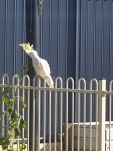
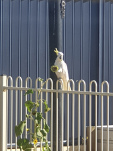
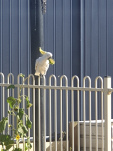
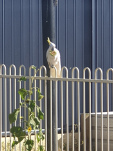
Cheeky! Lucky I love cockatoos. It was a treat to watch it enjoy the sunflowers.
~~~
Book of the week:
[image error]
~~~
Beautiful picture of the week:
[image error]
~~~
What I’m reading right now:
[image error]
~~~
Until next week… 
November 13, 2019
#DNF Book Review: Bitter Leaves by Tabatha Stirling
About the Book:
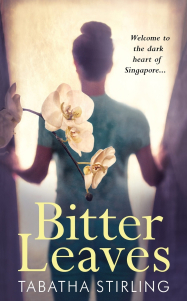
Welcome to the black heart of Singapore’s maid culture, where a woman’s life is cheap in one of the richest countries in the world.
Here are the voices of the unheard, of maid and employer, of village girl and city dweller. Follow Lucilla, Ma’am Leslie, Shammi and Madame Eunice as they strive, each in her own way, to exist in a country in which dark shadows lie beneath its pristine exterior.
The lives of these women are woven together by a narrative which is always candid and often brutal, as it explores the effects of loss, madness, abuse and hope during a woman’s life and in society as a whole.
My Thoughts:
I read a review for this novel, Bitter Leaves, earlier in the year, and while the review wasn’t overly glowing, it was still fairly solid and the premise of the novel sounded quite interesting to me, so I marked it as one to come back to.
I sat down to read some more this afternoon, I’m at about the 150 page mark, so over halfway, and it occured to me that I’m really not enjoying the novel at all. That if I were to finish it, it would be an exercise in forcing myself and I’ve got way too much waiting for me on my #tbr to keep on ploughing through something that is just not grabbing me. This novel was actually my selection for my final bingo category: reading a book with an author of the same initials as you. Didn’t quite work out like I envisaged, but not every book is a perfect fit for every reader.
I think my issue with this novel is mostly to do with the way it’s executed. It’s told entirely in the first person, which sometimes can work really well, but in this case, it’s just coming off as very monotone and stilted, a reiteration of events that aren’t moving forward. And it’s rather miserable, which is of course in keeping with the theme of the story, but I can’t help but feel as though it is a grim train to nowhere, for want of another expression. There is so much cruelty and abuse, too much so, it overwhelms and left me feeling quite drained, and the cast is far too large to keep track of without effort. As far as topics of writing go, it’s a very valid one with many interesting threads of possibility. It’s heartbreaking, how these maids are treated, so don’t for a moment think that I am dismissing the validity of this story or nullifying its importance. The story is one I’m interested in, I just don’t want to read it in its current state.
I’ll just chalk this one up to being a case of a misfit between the book and the reader. This whole not finishing a book that I’m not really liking is still very new to me. I’m not sure if it’ll ever sit all that well but like I said, there’s lots and lots of books on my #tbr that I can’t wait to get to, so it’s a case of #dnf for Bitter Leaves.
[image error]
Bitter Leaves
Published by Unbound (a crowdfunding/pledge publishing project)
Released March 2019
November 12, 2019
Book Review: Confession With Blue Horses by Sophie Hardach
About the Book:
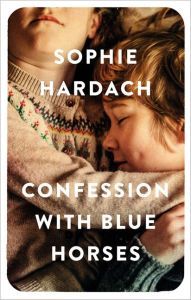
Set in Berlin during the dying days of communism, this is an exploration of a family cruelly torn apart, and the consequences that seep through generations.
Tobi and Ella’s childhood in East Berlin is shrouded in mystery. Now adults living in London, their past in full of unanswered questions. Both remember their family’s daring and terrifying attempt to escape, which ended in tragedy; but the fall-out from that single event remains elusive. Where did their parents disappear to, and why? What happened to Heiko, their little brother? And was there ever a painting of three blue horses?
In contemporary Germany, Aaron works for the archive, making his way through old files, piecing together the tragic history of thousands of families. But one file in particular catches his eye; and soon unravelling the secrets at its heart becomes an obsession.
When Ella is left a stash of notebooks by her mother, and she and Tobi embark on a search that will take them back to Berlin, her fate clashes with Aaron’s, and together they piece together the details of Ella’s past… and a family destroyed. Devastating and beautifully written, funny and life-affirming, Confession with Blue Horses explores intimate family life and its strength in the most difficult of circumstances.
My Thoughts:
Confession with Blue Horses is a rather magnificent novel that I enjoyed every moment of. It had me spellbound right from the beginning through to the end. Predominantly, this is a story about a family torn apart, but it also intimately explores what it was like to grow up in Berlin under the shadow of the Berlin Wall: that constant looming presence, the separation of families and friends, where life on one side was so vastly different to life on the other. This is the first novel I have read which has actually explored these concepts within this setting and I really liked the way the author looked at it from so many dimensions.
We have our main character, Ella, in 2010 with her brother Toby, both living in London. They moved to London after the fall of the Berlin Wall with their mother, but prior to the wall being taken down, they had for several years been living on the eastern side with their grandparents, while their mother was on the western side. She was a political prisoner that had been ‘bought out’ by west Berlin a couple of years into her sentence. Their father had been shot in the same failed escape that had resulted in their mother’s arrest. There is just so much that you can pull apart with this novel and really examine – it is filled with so much, yet has a distinct absence of clutter; a novel executed with such finesse and literary control.
‘It was something he had noticed before in East Germans, in the ones who were children when the Berlin wall fell. Nothing surprised them. They seemed to have no expectation of the world being any particular way; they knew that anything could happen, and when it did, they simply adjusted to it. He found it a slightly unsettling but somehow admirable quality, this absence of surprise. It made you realise how naïve you were to take the current state of things for granted, to think you knew what might happen next, to be taken aback when things turned out differently.’
Ella decides to return to Berlin after receiving a package containing some journals and art books that belonged to her mother. Bundled up with these things is an official letter regarding her mother’s enquiry into her own Stasi file. This instantly makes Ella interested in pursuing this line of enquiry further because she has a third brother, a younger one, who was taken from them when her mother was imprisoned as a political prisoner. Despite searching for years, her mother was never able to get very far in terms of locating him. These forced adoptions were rather common throughout the GDR, but after the fall of the wall, what had happened to these children was an aspect that was overlooked, so families remained without any knowledge of where their children had ended up. Ella feels compelled to follow this lead, that maybe by accessing her mother’s file; she might be able to trace her brother, whom she has not seen since he was an infant. Ella herself has not gone back to Berlin since she left after the wall collapsed and it was interesting to see her re-familiarise herself with a place that was so changed from when she had lived there, but still retaining familiar elements of the life that she remembered.
Our other main character is Aaron, who is doing an internship over in Berlin in what is supposed to be the Stasi Archives. I found this aspect of the story utterly fascinating. All of the efforts that were in place to recreate files and history. Literally bags of shredded documents where the ribbons and shreds were being pieced back together to create entire documents, the matching of words, fonts and paper. The work was incredibly meticulous and there was not a lot of room for error. It really pulled me up, physically, to contemplate this. The whole idea of people accessing files on themselves, trying to fill the holes of their own history; it is completely heartbreaking. Moreover, for many, the destruction of files went beyond shredding, so there would be no possibility of recovering that information. Aaron was taking his job very seriously, but he was also possessed with a need to make something right for someone through the course of this work. When his path crossed with Ella’s, it became a bit of a thing for him to try to give Ella information, even some closure, about her mother and the possible whereabouts of her younger brother, via the piecing together of her mother’s Stasi file.
‘She had been spied on, and she had spied on others. I believed that she had forgotten her brief affair with the Stasi as a young woman, because a human life is very long and many memories vanish along the way, especially the more inconvenient ones.’
The novel unfolds from three angles of perspective. We have Ella as an adult in Berlin following the footsteps of her past, trying to piece together what happened to her mother, why her mother even had a Stasi file, and how this could possibly be linked to the current whereabouts of her brother. Her other brother, Toby, keeps himself very distant from the entire proceedings, preferring to just experience it all second-hand via Ella. Then we have Aaron, who is there working away at the archives, learning a lot about what life was like when the Berlin Wall was up, the sort of things people endured at the hands of the Stasi; there is a lot of confronting stuff that he unearths as he slowly pieces together the information available, shred by shred. Alongside all of this, we are revisiting Ella’s childhood, the particular period during the late 80s when her life as she knew it imploded.
‘The future had always seemed limitless to me, an empty space to be filled by life. But it was not like that. It had already been filled in for me by others. Others had decided that I would cross this meadow, others had decided that I would walk through this forest, others had decided that I would live in West Germany. Their ideas were my reality. It was like everything else in my life – school, clubs, homework, chores, falling asleep at night, waking up in the morning. It was all arranged by others. I had no power at all – not over the present, not over the future.’
I mentioned earlier but it begs repeating, one thing I really admire about the author concerning this novel was the multifaceted view that she offered. We have Ella’s grandmother, who is a socialist, believing wholeheartedly in what was trying to be achieved in the GDR by the Socialist Party. Whereas, her daughter believed the opposite, craving freedom so much she was willing to sacrifice everything to obtain it. Moreover, of course there is Ella as a child in East Berlin. I really felt this novel tapped into what it must be like for so many Berliners who grew up in the 1980s under the shadow of the Berlin Wall and then with it coming down and communism being dismantled; it’s such a different life to what I have experienced and this weighed heavily on me throughout. The whole idea that you could have been a spy whilst also being spied upon; what a web of deceit that was being passed off as a natural way of living. The effects of this sort of life was conveyed well through the characters of Ella and even Toby. I had such mixed feelings as well, being angry with Ella’s parents for even attempting to escape, putting their family into such peril, and yet I could completely understand why they got to that point and why they felt they needed to make a break for it. ‘Survive? I don’t just want to survive, Mutti. I want to live.’ It’s novels like this that really make you appreciate so much about the freedom we take for granted in western countries. It is also very eye-opening in terms of beginning to understand the legacy of what this type of existence leaves within a place, just as much as within its people.
‘It must be because we’re talking in English, I thought. The words ‘interrogation’, ‘prison’ and ‘surveillance’ were just tabs in a folder; they referred to objects and experiences without actually evoking them. They had no power over me, they were lifeless. Whereas the German equivalents, especially the terms that would have been used in East Germany – Vernehmung, Haft, Überwachung – grabbed me by the throat. I heard them, or even thought them, and was in a damp cellar, barbed wire hanging over my head, an unseen thing crouching in the corner. Darkness, rustling leaves, the sound of my own breath, and then a sudden light.’
I really loved the title of this novel and its origins. The significance of the title becomes apparent as the novel progresses and it is intimately tied to a photograph of a painting of three blue horses that Ella finds pressed in between the pages of an art book belonging to her mother. There is a little story that Ella’s mother would tell them about the three blue horses, but of course, there is more to the painting than a made up story. Of far greater significance, is the original painting of the blue horses within the context of a confession, reiterating just how perfect a title this is. I did find that this was a very life-affirming novel, such an important ode to family and love, about so many things that so many of us take for granted. I would really like to visit Berlin one day and just walk the streets, have a look around and really see and contemplate the legacy of the Berlin Wall. I do highly recommend Confession with Blue Horses. It is an outstanding novel, absolutely brilliant literature and it is definitely going on my list of best books for the year.
‘The blue horses were standing on a meadow dotted with wildflowers. To the right was a corn field, tall stalks swaying in the breeze. At the back, towards the horizon, loomed a dense forest. It was the meadow, and the forest. It was the place where we had tried to cross. Sven must have discovered the meadow during one of his painting trips to Hungary. A quiet area without a watch tower in sight, without a border guard. He had painted it, and months later he had gone back, crossed the meadow and climbed through the barbed wire.’





Thanks is extended to HarperCollins Publishers Australia for providing me with a copy via NetGalley of Confession with Blue Horses for review.
About the Author:
Sophie Hardach is the author of two novels, The Registrar’s Manual for Detecting Forced Marriages, about Kurdish refugees, and Of Love and Other Wars, about pacifists during World War Two. Also a journalist, she worked as a correspondent for Reuters news agency in Tokyo, Paris and Milan and has written for a number of publications including the Atlantic, the Guardian and the Daily Telegraph.
[image error]
Confession with Blue Horses
Published by HarperCollins Publishers Australia (Head of Zeus – GB)
Released on 17th June 2019
November 11, 2019
My Reading Life: Themes of Communism
A couple of months ago I read this:
[image error]
And not all that long after, I read this:
[image error]
Now, both of these novels have really sparked my interest in reading more about life in the Eastern Bloc, and in the last couple of weeks, I’ve continued with this theme, reading:
[image error]
And, most recently:
[image error]
I’m not tiring of this theme at all. So much so, I’ve jumped right into:
[image error]
I also have this on my #tbr:
[image error]
And even though I prefer to stick with fiction, I feel compelled to read this one:
[image error]
Any other suggestions for me, in keeping with this era and setting? Fiction is preferable, but certainly suggest non-fiction if you’ve read something excellent that you think I shouldn’t leave out. I’m sure this obsession will run its course eventually, but at present, it feels as though it’s just gaining momentum.



